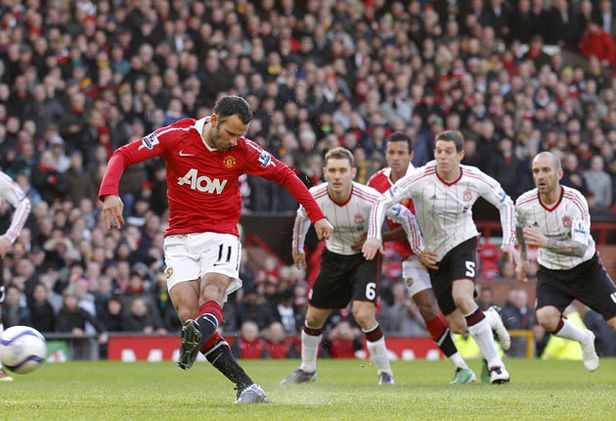News
Giggs snuffs out hopes Dalglish's return would restore old order

From the moment Sir Alex Ferguson emerged from the Old Trafford tunnel and started waving his arms about, appealing to the home crowd to raise the pre-match atmosphere, you knew that the Manchester United manager was concerned yesterday might become Liverpool's day.
By doing nothing to disguise the fact that he knew the impact Kenny Dalglish's return would have on Liverpool yesterday, Ferguson inadvertently paid his old adversary the greatest compliment he could. Anyone at Old Trafford could hardly have failed to notice the Dalglish effect; the away fans were in the ground long before kick-off and they sounded the happiest they have in a long time.
As for the team, Dalglish picked a Liverpool side that would have appealed to the supporters. There was no Paul Konchesky in the side, with Fabio Aurelio a more popular choice, and a sprinkling of younger players on the bench. Then, as Dalglish came down the touchline to take his place in the dugout, he looked up at the away support, applauded, smiled and punched the air.
It provoked a response full of joy, affection and, it was impossible to ignore, optimism. From his seat in the dugout Ferguson cannot have failed to notice the mood. It took him the best part of a decade to depose Liverpool from their perch and the prospect of them clambering back up to it one day – one day in his lifetime – must still represent his greatest nightmare.
When Dalglish quit Liverpool in 1991, United were in their 23rd season without a league title and Ferguson, in his fifth year at the club, had finished a disappointing 13th the previous season, 31 points behind Dalglish's champions. In the years that followed he might have seen off Dalglish in his subsequent roles as Blackburn and then Newcastle manager, but as Liverpool manager, Dalglish retired when he was still on top.
So, yes, this day was about Dalglish but what should never be forgotten about Ferguson is that, despite his 11 titles and his great success, his entire professional existence is based on the continued subjugation of his managerial rivals. And Dalglish, 11 years out the game, is still a man who cannot be taken lightly, not now he is back at the club that once oppressed Ferguson and United in the 1980s.
What irony then that United should win a penalty after 32 seconds, exactly the kind of borderline decision that Ferguson once claimed Liverpool were given as a matter of course at home when he uttered that famous quotation in 1988 that clubs "come away from Anfield choking on their vomit and biting their tongues knowing they have been done by the referee".
Times have changed and Dalglish did not go that far, although he did call Howard Webb's decision to penalise Daniel Agger's challenge on Dimitar Berbatov "a joke". On balance it looked like the referee got it right. There was contact between the two and few Premier League strikers require a second invitation to go to ground.
Despite the bleak start, this game was not a disaster for Dalglish – in mitigation, his team had to cope with Steven Gerrard's needless red card. The Liverpool captain's reckless two-footed lunge at Michael Carrick after 32 minutes meant that a comeback was highly unlikely and, in the end, a 1-0 defeat turned out to be quite a respectable result.
Dalglish argued with Gerrard's dismissal too, although goodness knows why. There was not much anyone could do to explain why such an accomplished footballer would have such a self-destructive rush of blood. It was a long, lonely walk for Gerrard from the centre spot to the tunnel at the corner of Old Trafford and it was clearly an effort for him to keep a lid on his emotions.
The Liverpool captain had not liked his England team-mate Rio Ferdinand's intervention in the aftermath of the tackle and words were exchanged. Liverpool's strongest case for the defence was that Rafael da Silva had gone in two-footed on Raul Meireles seconds earlier but it was nowhere near as bad as Gerrard's challenge. He had to go.
It will concern Dalglish that his side's best player was Pepe Reina, who almost got to Ryan Giggs' penalty and made four brilliant saves in the space of a few seconds on 69 minutes as the ball fizzed around the Liverpool penalty area.
What of Fernando Torres? It was not the kind of inspirational contribution that Liverpool and Dalglish require from him but it was not as bad as some of those could-not-care-less performances that distinguished his worst efforts this season. He was substituted before the end for David Ngog and trotted dutifully to the bench.
For any Liverpool player, even Gerrard, Dalglish is a difficult man to let down and the full consequences of the captain's red card will be felt in his suspension over the next three games – especially against Everton next Sunday.
This was another of those United performances in which their form could hardly be described as irresistible but they were damned hard to break down. Ferdinand was excellent again and he was alongside Jonny Evans, back for the first time since that dreadful performance in November against West Ham in the Carling Cup, who hit the post with a header at the end of the first half.
Giggs was the pick of the team but Rafael, aggressive and sharp throughout, was not too far behind. United should have been a long way out of sight before the end of the game, especially as Liverpool's 10 men tired, but there remains something missing from Ferguson' s team. Still, top of the Premier League, in the Champions League knockout stages and away at League One Southampton in the FA Cup fourth round – it is not a bad position.
There was an insight into Dalglish's thinking when he gave Ryan Babel a run-out on the hour and the Dutchman responded with a lively, committed effort. It looks as if the Scot is prepared to give everyone a chance. As for going to war with Ferguson, United and the prevailing current powers in English football – that can wait. Although if Dalglish has plans to stick around beyond May, that battle will have to be fought one day.


